Types of Adjectives
Adjectives are terms to describe or alter other terms, making your writing and speech more particular and intriguing.
Adjectives are frequently placed well before nouns or pronouns that they alter since they are used to describe or measure specific individuals and things.
Descriptive words such as little, red, and pointy are all instances of adjectives. Multiple adjectives are used in some statements.
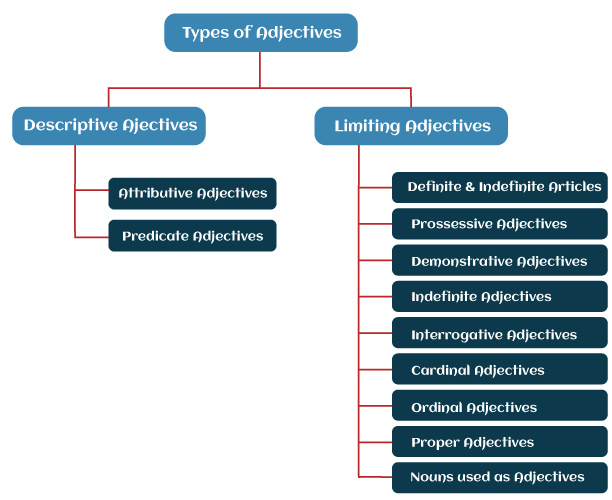
Adjective Examples
In the below mentioned sentences, the highlighted words are the adjectives:
- They reside in a huge, attractive mansion
- It is a hotday; I prefer to wear shorts.
- The Himalayas are enveloped in sparkling snow.
- On her anniversary, Bushra got an antique showpiece.
Types Of Adjectives
1. Descriptive Adjectives
Descriptive adjectives are the most popular of the adjective categories.
Descriptive adjectives are typically what first to mind when thinking of a word that modifies a noun. This sort of adjective characterizes a noun by conveying a characteristic or quality.
A descriptive adjective might transform “the brother” into “the big brother” or “the flower” into “the cheerful daisy.” The adjectives are bold in all instances, and the nouns they alter are emphasized.
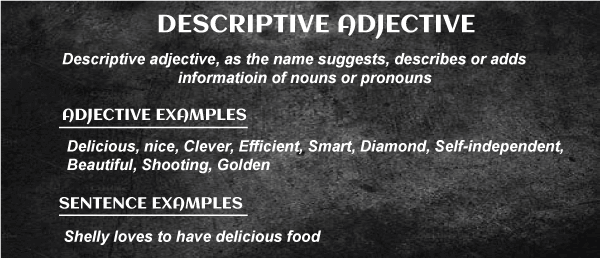
Let us have a look at some instances of these types of adjectives;
- For hours, the stupid dog played around in the disgusting dirt.
- She’s a fantastic cashier.
- He injured her feelings when he referred to her as an irritating sister.
2. Adjectives with Coordinates (Coordinated Adjectives)
Coordinate adjectives are tiny sets of adjectives that all alter the same noun. They are split with the words “and” or commas.
An adjective phrase can be formed by using a phrase containing many adjectives to alter the same noun.
Let us have a look at a few examples of these types of adjectives;
- Yesterday, she donned a pink and yellow shirt.
- It was a cheerful, pleasant, and splendid morning along Beach.
- Their murder was a sad, tragic, and heinous crime.
When stacking terms before a noun, be cautious. For instance, “purple dressing gown” lacks commas and the term “and.” This is due to the word “purple” modifying the word “hospital gown.”
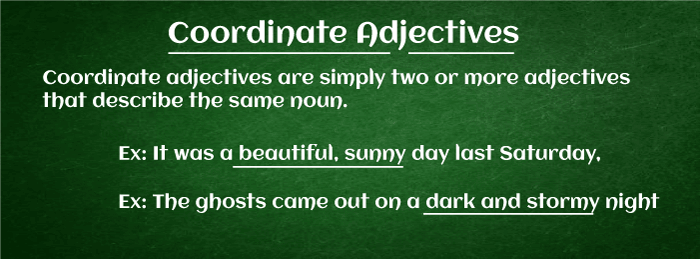
If you are unsure about two terms that could be a modifier, put the word “and” between them. If it doesn’t make sense, it suggests you are in work with the descriptive adjectives rather than a coordinate adjectives.
3. Adjectives that are compounded (Compounded Adjectives)
A compound adjective is one that is composed of many words. Unlike the coordinative adjective, this sort of adjective does not consist of independent words.
A compound adjective refers to the two or more terms (or a digit plus a term) that function together to alter the noun. They are commonly hyphenated.
Let us see some instances of these types of adjectives;
- I have a 900-word article due.
- I went out and purchased some fat-free cheese.
- We’ll be on a five-hour boat cruise.
- I’m seeking a full-time position.
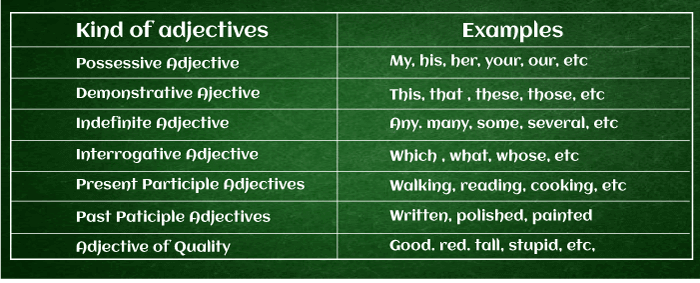
4. Proper Adjectives
A proper noun is a term that is distinctive to an individual, place, or thing. Since proper adjectives originate from proper nouns, they should be capitalized.
As a result, rather than “she,” we have “Mary.” We have “China” rather than “country.” Proper adjectives resemble their ancestors, proper nouns. They only move slightly. They’re usually utilized to describe something related to its noun counterpart.
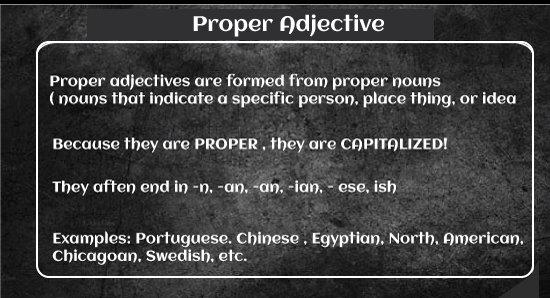
Let us see some of the instances of these types of adjectives;
- I love Japanese cuisine.
- She’ll be attending a Shakespearean event.
- It was a Freudian slip, to be sure.
5. Demonstrative Adjectives
A demonstrative adjective usually indicates which word or pronoun is being discussed. In the English language, there are four demonstrative adjectives: this, that, these, and those.
Demonstrative Adjectives are most often (but not always) placed well prior the noun they change. Adjectives that are demonstrative are often positioned centrally before the noun they are altering.
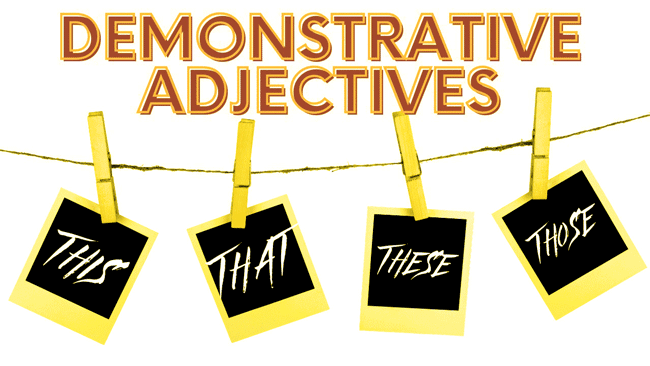
Let us have a look at a few examples of these types of adjectives;
- Do you want to buy this mountain bike?
- That used to be my automobile.
- I’m not interested in these awards.
- Those slippers are stunning.
6. Distributive Adjectives
Specific individuals of a class or group are referred to as distributive adjectives. They denote the collective aspect of persons or things that can be counted.
Any, each, either, every, and neither are some of the best-known distributive adjectives. Like most of their group, such adjectives stand exactly next to the noun they’re altering.
Let us have a glance at some of the examples of these types of adjectives;
- Does any one of you know him?
- Each student will receive an invitation.
- Either shirt will fit you properly.
- He bought every chocolate in that shop.
- Neither student called me back.
7. Adjectives that are indefinite
Indefinite adjectives define nouns or pronouns in a broad sense. These adjectives refer to non-specific entities. Few, many, no, several, and some are examples of indefinite adjectives.
These euphemisms indicate that you’re on the hunt for an indefinite adjective.
Let us have a look at a few examples of these types of adjectives;
- Only a few individuals make it this far.
- Does your company have many vacancies?
- There seem to be no novels in this reading room.
- I checked several sources.
- There are still some spots left.
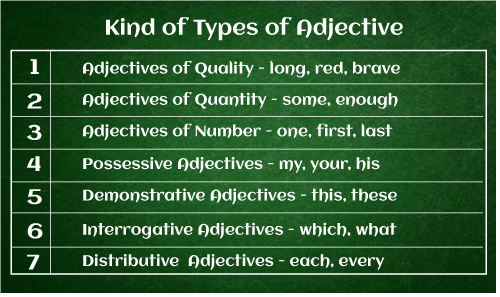
8. Adjectives of Interrogation
Interrogative adjectives are used to ask a question. They require the assistance of nouns or pronouns.
Keep an eye out for the terms what, which, and whose in this section.
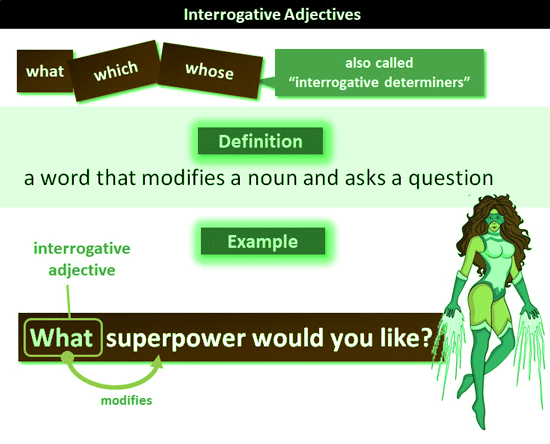
Let us have a look at a few examples of these types of adjectives;
- What colours do you like the villa to be?
- Which jacket would you want to buy?
- Whose property are we walking on?
Other words that ask questions, like “who” and “how,” are not adjectives since they do not alter nouns. For example, you could inquire, “Whose property are we walking on?” However, it is incorrect or wrong to ask, “Who property are we walking on?” or “How property are we walking on?”
9. Possessive Adjectives
Possessive adjectives are useful indicators for showing possession. Possessive adjectives indicate ownership.
These are simple and easy to use and recognize. His, her, my, your, and their are key participants in the possessive adjective arena. Possessive adjectives are frequently used before possessive nouns.
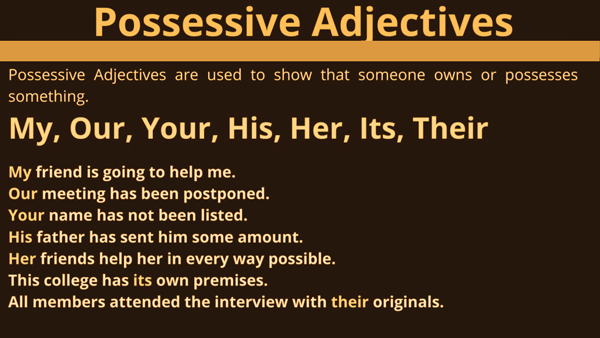
Let us have a glance at some of the examples of these types of adjectives;
- Is that their Sportscar?
- Don’t mess with our Porsche.
- Oops, I didn’t realize this was your Vehicle.
10. Predicate Adjectives
The instances mentioned above are of the attributive adjectives, except perhaps some of the possessive adjective. In other words, they occur just before the noun that they change. However, things become a bit challenging/tough when it pertains to linking verbs (am, is, are, was, were).
Predicate adjectives are those that come after the linking verbs and change the subject of the statement.
These adjectives can be tough to recognize since they are positioned after the verbs instead of prior the nouns, but they still nevertheless pertain to the adjective family.
Let us peek into some of the examples of these types of adjectives;
- She is clever.
- We are wealthy.
- They were successful.
11. Adjectives with Quantitative Values
A quantitative noun is any quantity that provides additional info about a noun.
Quantitative adjectives express how much of something there is. They do more than just change a noun or pronoun. They also address questions such as “How much?” and “How many?”
Words like “one” and “two” become adjectives as a result of this.
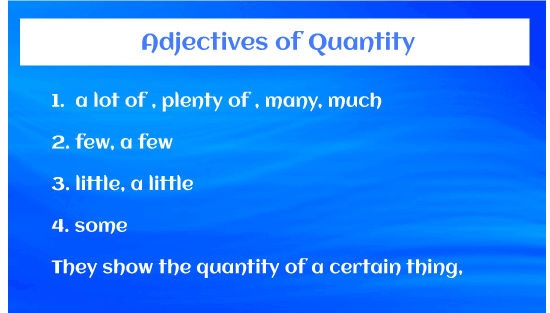
Let us peek into some of the examples of these types of adjectives;
- Diana has two kids.
- I plan to have six pets in the coming years.
- In fact, I’ll carry the whole trash.
As an aside, it’s commonly recognized practice to write down the digits 0 through 9 and use digits for any of them ten or above when writing digits.
12. Superlative adjectives
When comparing more than two individuals or objects, superlative adjectives are employed to indicate which is the more superior or extreme.
Words like sharpest, fastest, most remarkable, and least useful are instances of superlative adjectives.
- Ryan is our group’s fastest player.
- That’s the oldest of all of my publications.
- We are trying to sort out the least complicated way of explaining the lesson to the undergrads.
13. Comparative adjectives
Comparative adjectives are often used to contrast two dissimilar individuals or things.
Words like shorter, speedier, more costly, and less acceptable are examples of comparison adjectives.
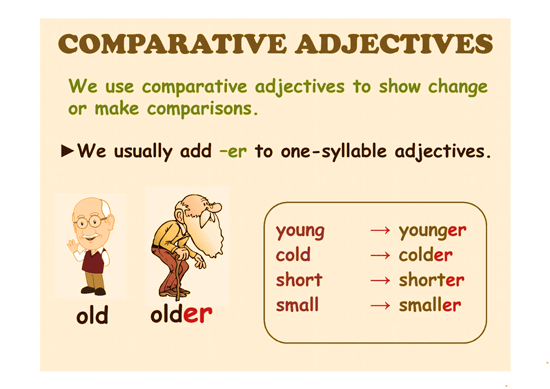
- Sharks are much larger than the dolphin.
- We relocated to a cheaper locality.
- The series was even more fantastic than the first film.
14. Adjectives as Articles
This is when things become complicated. In the English Grammar, there are three articles (a, an, and the). Aren’t articles just that?
There are articles that are definite and articles that are indefinite. In statements, the articles also function as adjectives. They are placed next to the nouns they alter.
- I recently adopted a puppy.
- It’s an elephant.
- Don’t pull the turtle away.
An Adjectival Attitude
Most of you must have heard of the term “flowery” applied to the content or writing. They usually stuff it with descriptions – most often the adjectives or adverbs – and thus make their write-up clumsy. Of course, it’s critical to be aware of and comprehend the numerous forms of adjectives.
However always determine the number of adjectives you should use in your write-up. There is no need to utilize a variety of adjectives in every statement.
You don’t want to go too far with this, just like you don’t want to go too far with anything else. Keep a couple of adjectives from this big list in your back pocket with that in mind. Maybe one of them may come in handy in your next short story, poem, or discussion.
